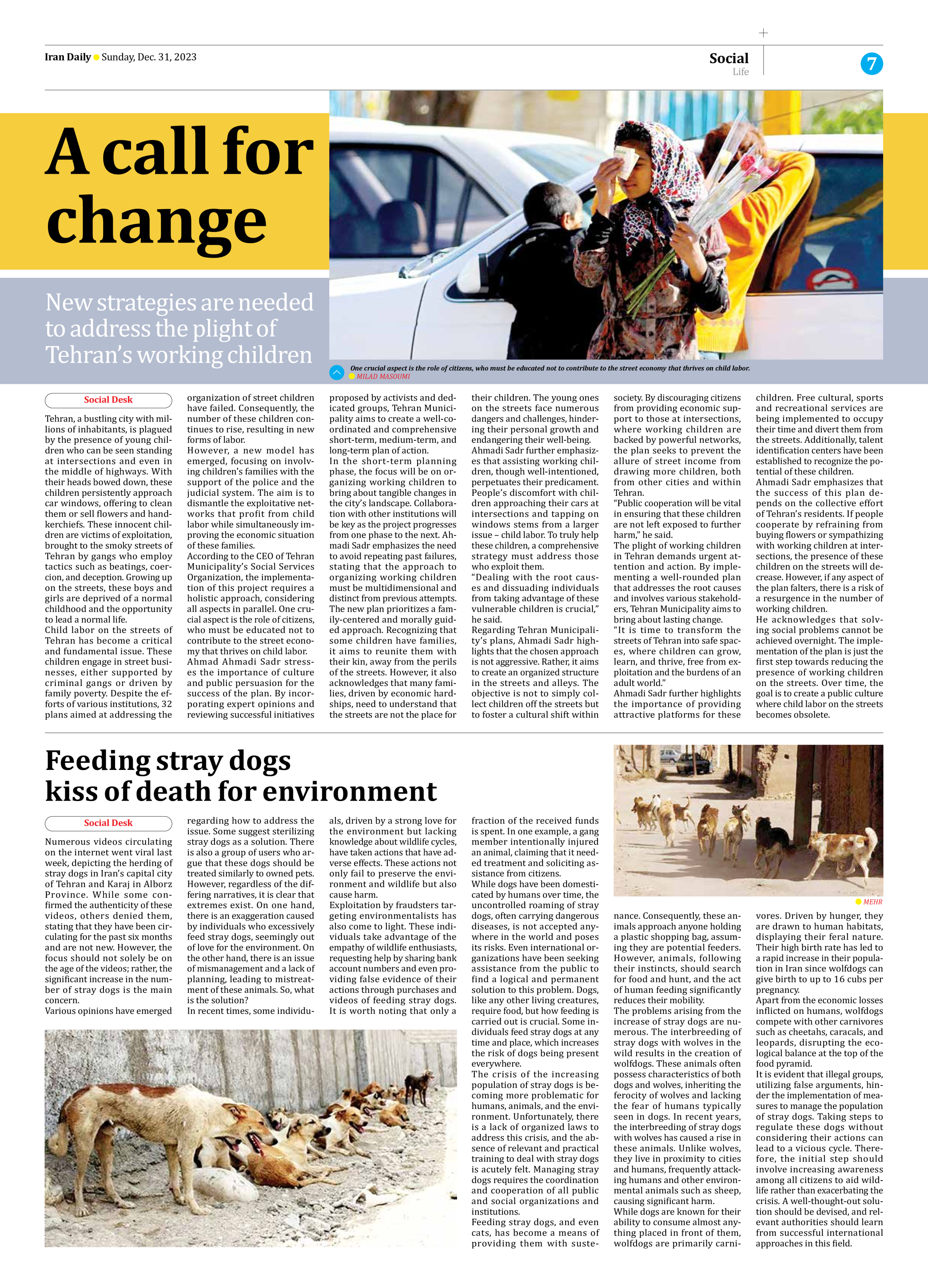
Feeding stray dogs kiss of death for environment
Numerous videos circulating on the internet went viral last week, depicting the herding of stray dogs in Iran’s capital city of Tehran and Karaj in Alborz Province. While some confirmed the authenticity of these videos, others denied them, stating that they have been circulating for the past six months and are not new. However, the focus should not solely be on the age of the videos; rather, the significant increase in the number of stray dogs is the main concern.
Various opinions have emerged regarding how to address the issue. Some suggest sterilizing stray dogs as a solution. There is also a group of users who argue that these dogs should be treated similarly to owned pets. However, regardless of the differing narratives, it is clear that extremes exist. On one hand, there is an exaggeration caused by individuals who excessively feed stray dogs, seemingly out of love for the environment. On the other hand, there is an issue of mismanagement and a lack of planning, leading to mistreatment of these animals. So, what is the solution?
In recent times, some individuals, driven by a strong love for the environment but lacking knowledge about wildlife cycles, have taken actions that have adverse effects. These actions not only fail to preserve the environment and wildlife but also cause harm.
Exploitation by fraudsters targeting environmentalists has also come to light. These individuals take advantage of the empathy of wildlife enthusiasts, requesting help by sharing bank account numbers and even providing false evidence of their actions through purchases and videos of feeding stray dogs. It is worth noting that only a fraction of the received funds is spent. In one example, a gang member intentionally injured an animal, claiming that it needed treatment and soliciting assistance from citizens.
While dogs have been domesticated by humans over time, the uncontrolled roaming of stray dogs, often carrying dangerous diseases, is not accepted anywhere in the world and poses its risks. Even international organizations have been seeking assistance from the public to find a logical and permanent solution to this problem. Dogs, like any other living creatures, require food, but how feeding is carried out is crucial. Some individuals feed stray dogs at any time and place, which increases the risk of dogs being present everywhere.
The crisis of the increasing population of stray dogs is becoming more problematic for humans, animals, and the environment. Unfortunately, there is a lack of organized laws to address this crisis, and the absence of relevant and practical training to deal with stray dogs is acutely felt. Managing stray dogs requires the coordination and cooperation of all public and social organizations and institutions.
Feeding stray dogs, and even cats, has become a means of providing them with sustenance. Consequently, these animals approach anyone holding a plastic shopping bag, assuming they are potential feeders. However, animals, following their instincts, should search for food and hunt, and the act of human feeding significantly reduces their mobility.
The problems arising from the increase of stray dogs are numerous. The interbreeding of stray dogs with wolves in the wild results in the creation of wolfdogs. These animals often possess characteristics of both dogs and wolves, inheriting the ferocity of wolves and lacking the fear of humans typically seen in dogs. In recent years, the interbreeding of stray dogs with wolves has caused a rise in these animals. Unlike wolves, they live in proximity to cities and humans, frequently attacking humans and other environmental animals such as sheep, causing significant harm.
While dogs are known for their ability to consume almost anything placed in front of them, wolfdogs are primarily carnivores. Driven by hunger, they are drawn to human habitats, displaying their feral nature. Their high birth rate has led to a rapid increase in their population in Iran since wolfdogs can give birth to up to 16 cubs per pregnancy.
Apart from the economic losses inflicted on humans, wolfdogs compete with other carnivores such as cheetahs, caracals, and leopards, disrupting the ecological balance at the top of the food pyramid.
It is evident that illegal groups, utilizing false arguments, hinder the implementation of measures to manage the population of stray dogs. Taking steps to regulate these dogs without considering their actions can lead to a vicious cycle. Therefore, the initial step should involve increasing awareness among all citizens to aid wildlife rather than exacerbating the crisis. A well-thought-out solution should be devised, and relevant authorities should learn from successful international approaches in this field.







